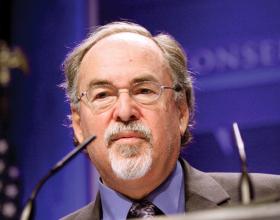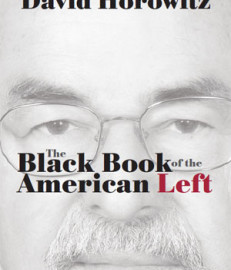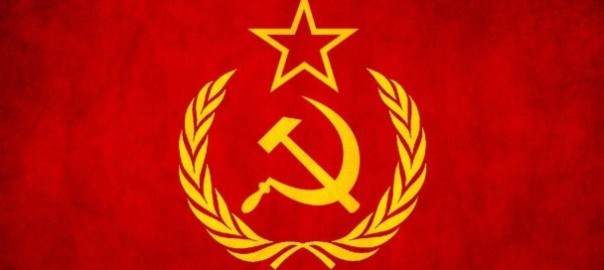Reprinted from WND.com.
David Horowitz’s “The Black Book of the American Left: Collected Conservative Writings” should be read by every American who loves his country. This book is a unique wake-up call to the truth that America is being infected by the bubonic plague of Marxism, which once contaminated the author himself.
In the 1970s, David climbed to the very top of the American leftist movements. Later he understood that Marxism was a lie – the first step toward stealing and killing – and after that he dedicated the rest of his life to warning others that Marxism was endangering American freedom and democracy. A Rasmussen Reports poll shows, indeed, that nowonly 53 percent of Americans prefer capitalism to socialism.
One of the most popular night clubs in New York City is the Soviet-themed KGB Bar. The place, adorned with the Soviet flag and a picture of “Comrade Lenin,” is jammed by a new generation of Marxist writers who read from their work. Just weeks ago this giant city overwhelmingly elected (73 percent of the votes) an openly Marxist mayor, and Seattle got a new council member who proudly stated that she wore “the badge of socialist with honor.” Russia’s post-Soviet newspaper Pravda, which knew that socialism was just a smiling mask for Marxism, chafed: “It must be said that like the breaking of a great dam, the American descent into Marxism is happening with breathtaking speed, against the backdrop of a passive, hapless sheeple, excuse me dear reader, I meant people.”
America is still not really aware that Marxism is infecting the country because our main media have gone to great lengths to hide this truism, and because neither the Republican Party nor the tea party has called attention to the looming dangers of Marxism. Our main media are also deep-sixing the fact that the only thing Marxism ever left behind it is countries that ended up looking like trailer camps hit by a hurricane, and Marxist leaders roasting in Dante’s Inferno – all of them, from Trotsky to Stalin, from Khrushchev to Brezhnev, from Tito to Enver Hoxha, along with Mátyás Rakosi, Sékou Touré, Nyeree, Ceausescu and Hugo Chavez.
David Horowitz was born into a family of devoted Marxists, had Marxism in his blood and pursued a successful career as a Marxist activist, writer and journalist. In 1974, some of his Marxist comrades – leaders of the Black Panther Party – murdered a bookkeeper whom David had recruited to keep the accounts of a Panther school he had helped create. That horrible crime hit home and persuaded David to forsake his highly successful leftist career and to move over onto the other side of America’s political barricade.
The David Horowitz Freedom Center and its FrontPage Magazine, created by David in 1988, marked the beginning of his anti-Marxist crusade, which has never stopped. His book “The Professors: The 101 Most Dangerous Academics in America” (2006) and his Academic Bill of Rights (ABR) marked another milestone in his life: the beginning of his still-vigorous campaign against Marxist indoctrination at American universities. (Full disclosure: Although I have never met David, I do collaborate with his FrontPage Magazine, and I have repeatedly expressed my admiration for his break with Marxism. David had also publicly praised my split with communism.)
In the preface to “The Black Book of the American Left,” the first of a nine-volume memoir, David Horowitz wrote that “for better or worse, I have been condemned to spend the rest of my days” fighting Marxism, “from which I have separated myself.” In May 1989, he and two other former prominent Marxists, Ronald Radosh and Peter Collier, went to Poland to attend a conference calling for the end of Communism. There, David told the Polish dissidents: “For myself, my family tradition of socialist dreams is over. Socialism is no longer a dream of a revolutionary future. It is only a nightmare of the past. But for you, the nightmare is not a dream. It is a reality that it is still happening. My dream for the people of socialist Poland is that someday you will wake up from your nightmare and be free.” A few months later, the Roundtable talks between the Polish government and the Solidarity-led Polish dissidents led to the first semi-free elections in the Soviet bloc.
On Nov. 9, 1989, when I watched on television as the Berlin Wall was being torn down, my eyes were misty. I was so incredibly proud to be an American. The whole world was expressing its gratitude to the United States for its 45 years of successful Cold War against the Soviet evil. “Communism is dead!” I heard people shout. Indeed, Communism was dead as a form of government. But it soon proved that Marxism, which had just celebrated its 141st birthday, had survived.
French philosopher Jacques Derrida, who once claimed he had broken with Marxism but confessed to still being choked with emotion whenever he heard the Internationale, reminded us that the first noun in Marx’s “Communist Manifesto” is specter: “A specter is haunting Europe, the specter of Communism.” According to Derrida, Marx began “The Communist Manifesto” with specter, because a specter never dies. David Horowitz concurred. “After Stalin’s death,” he writes in his memoirs, his parents – who had dedicated their whole lives to Marxism – learned that “they served a gang of cynical despots who had slaughtered more peasants, caused more hunger and human misery, and killed more leftists like themselves than all the capitalist governments since the beginning of time. … I was 17 at that time, and at the funeral of the Old Left I swore to myself I would not repeat my parent’s fate. … But my youth prevented me from comprehending what the catastrophe had revealed. I continued my fantasy of the socialist future. When a New Left began to emerge a few years later, I was ready to believe that it was a fresh beginning and eager to assist at its birth.”
David Horowitz now documents that a new generation of Americans, one that is not being taught history anymore and knows little if anything about our country’s long fight against Marxism, is giving this heresy – which killed over 90 million people – another lease on life. In 2008, the Democratic Party portrayed the United States as a “decaying, racist, capitalist realm,” unable to provide medical care for the poor, to rebuild her “crumbling schools,” or to replace the “shuttered mills that once provided a decent life for men and women of every race,” and it pledged to change it by drastically increasing taxes on the American rich, American businesses and their owners, in order to finance programs for the poor. This is Marxism at its best. In “The Communist Manifesto,” Marx painted capitalism as “a decaying, racist realm,” and pledged to eradicate it by advocating 10 “despotic inroads on the rights of property,” which became known as the “Ten Planks of the Communist Manifesto.” Among them: a heavy progressive or graduated income tax; abolition of all rights of inheritance; abolition of property.
If you know the “Manifesto,” as David does, you will think Marx himself wrote the Democratic Party’s economic program, which contains all of the above planks of Marxism. If you don’t know the “Manifesto,” glance through “The Black Book of the American Left.” Young people, as David was when he ignored Stalin’s unprecedented crimes, believe in free lunches. No wonder that during the 2008 election campaign, the U.S. Democratic Party easily filled entire stadiums with young people who demanded that the wealth of the United States be redistributed. Some of those electoral gatherings looked to me like Ceausescu’s revival meetings – over 80,000 young people were gathered in front of the now-famous Greek temple resembling the White House that had been erected in Denver, to demand that America’s wealth be redistributed. The Democratic Party won the White House and both chambers of the U.S. Congress.
People have come to look kindly upon the “redistribution of wealth,” but David Horowitz convincingly demonstrates that this is the quintessence of Marxism, and that Marxism always ended in economic collapse. I concur. “Stealing from capitalism is moral, Comrades,” I heard Khrushchev say during the 1959 “six-day vacation” he spent in Romania. “Don’t raise your eyebrows, Comrades. I intentionally used the word steal. Stealing from our enemy is moral, Comrades.” “Stealing from capitalists is a Marxist duty,” Romania’s president, Nicolae Ceausescu, sermonized during the years I was his national security adviser. “Capitalists are the mortal enemies of Marxism,” I heard Fidel Castro preach in 1972, when I spent a vacation in Cuba as guest of his brother, Raul. “Killing them is moral, comrades!”
In my other life I rose to the top of a Marxist entity – the Soviet empire – which was created by redistributing the wealth of its people, and I had to start my life from scratch, as David did, to escape its tyranny. Redistribution of wealth is disguised stealing – the next step toward killing – and stealing and killing became national policies on the day Soviet Marxism was born. Immediately after the revolution of November 1917, the Soviet Marxists confiscated the imperial family’s wealth, seized the land owned by the rich Russians, nationalized Russian industry and banking, and killed most of the property owners. In 1929, by forcing the peasants into collective farms, the Soviet Marxists stole away their land, along with their animals and agricultural tools. Within a few years, virtually the entire Soviet economy was running on stolen property. When people began protesting the theft, the Marxists transformed the Soviet Empire into a tyrannical police state. Over 20 million people were killed to keep that gulag empire quiet. In the long run, however, theft and crime do not pay even when they are committed by a superpower. The 1991 collapse of the Soviet Union is strong proof to that.
On Feb. 7, 2009, the cover of Newsweek magazine proclaimed: “We Are All Socialists Now.” That was also what Ceausescu’s newspaper Scînteia proclaimed when he changed Romania into a monument to Marxism. Two years after seizing power, the U.S. Democratic Party’s Marxism produced the same results as the Ceausescu’s Marxism did – at a U.S. scale. Over 14 million Americans lost their jobs, and 41.8 million people went on food stamps. GDP growth dipped from 3-4 percent to 1.6 percent. The national debt rose to an unprecedented $17 trillion, and it is projected to reach $18 trillion by 2019. Scînteia went bankrupt. Newsweek was sold for one dollar.
So, let call a spade a spade: it is Marxism we are talking about. Marxism in America!
“The Black Book of the American Left” could not have come to life at a better time. Understanding that Marxism is a lie, and that lying is the first step toward stealing and killing, is what America needs right now.
Lt. Gen Ion Mihai Pacepa is the highest-ranking Soviet bloc official ever to defect to the West. In 1989 Romanian president Nicolae Ceausescu was executed at the end of a trial whose main accusations came out of Pacepa’s book “Red Horizons,” republished in 27 countries. His latest book, “Disinformation,” co-authored with professor Ronald Rychlak, was published last June by WND.



